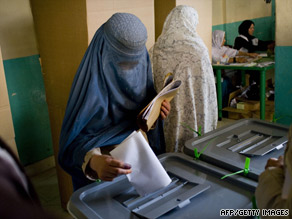David L. Chaplin II
Impunity Watch, Asia
In what was a pivotal test for Afghanistan’s inexperienced democracy spell business as usual. Recent evidence of fraud has presented the questionably elected President Karzai with a stained reputation.

After the devastating announcement on Monday that the Afghanistan’s Independent Election Commission released of ballot-box stuffing and bribery have tainted the vote.
Meanwhile, the UN-backed Afghan Electoral Complaints Commission is investigating more than 4,000 formal complaints.
Since then 1.3 million votes of the total of 5.6 million ballots have been cancelled out because of fraud. That means about 23 percent of the total votes were tossed out, the election commission said Wednesday.
Afghan President Hamid Karzai pledged to cut corruption and increase transparency after he was re-elected in August 2009 election that was later deemed fraudulent by the United Nations and other vote-monitoring organizations.
More than 220 candidates are being investigated for fraud in the election, turnout for which was around 40%.
More than 2,500 candidates stood for 249 seats in the lower house of parliament, the Wolesi Jirga. Sixty-eight seats have been set aside for women.
The current parliament is stacked with former warlords and power brokers, and many of the candidates in September’s election have ties to Afghanistan’s old elite.
Final results are not expected before the end of the month once poll investigators finish their work.
“Turnout is around 5,600,000, the valid vote is 4,265,347, and the invalid vote is around 1, 300, 000,” Fazil Ahmad Manawi, head of the Independent Election Commission (IEC), said on Wednesday.
Deputy chief of election commission, Zekria Barikzai, cautioned that the number of votes thrown out was similar to the votes thrown out in the presidential election which cast Karzai the victor. “In parliamentary election some of the powerful local people tried to influence the process,” Barikzai said.
Paul Wood, BBC News, said despite the throwing out of 1.3 million votes, there will probably be no rush by the international community to condemn the election.
Ultimately, the poll’s measure of success will be how it affects the stability of the country. There was widespread intimidation during the vote, with Taliban insurgents threatening people not to take part.
Many observers had hoped that the parliamentary elections would show the Afghan government’s commitment to reforming its corrupt bureaucracy.
“These elections will do little to alter Afghanistan’s system of patronage politics, and will certainly not alter the balance of power,” a Western official, speaking on condition of anonymity, said.
The official said the parliamentary poll represented “politics as usual, just as corrupt and just as violent as last year”.
It is an outcome that NATO and the international community can live with and so these elections will no doubt be judged a success, said Wood.
Afghanistan lacks political parties and parliamentary blocs form according to ethnic or geographical alliances.
Despite weak parties, powerful patronage networks, and entrenched corruption, the Wolesi Jirga (lower house of parliament) acts as a check on the power of President Hamid Karzai.
For more information, please see:
Al Jazeera English –Afghan officials cancel 1.3m votes – 20 October 2010
BBC – Afghanistan rules 1.3m paralimentary votes are invalid – 20 October 2010
CNN World – More than 20 percent of vote thrown out in Afghan election – 20 October 2010